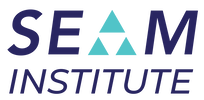About the SEAM Institute
MISSION
To share and accumulate knowledge about SEAM among practitioners, advocates and users of SEAM
VISION
For organizations of all kinds to operate using the principles of SEAM, and as a result to promote the dignity and value of every human being while enabling organizations to improve their productivity.
VALUES
The work of the SEAM Institute is based on the following values:
Integrity
Speaking and acting in alignment with ones espoused values and beliefs.
Dignity of every person
Every person is important and has value. This means that employees are not disposable cogs in the organizational machinery,
to be disposed of when it is financially convenient for the organization. Each employee deserves to be treated with respect,
and each workplace has the obligation to promote the development of human potential.
Whole system approach
In order to change the way organizations work, the focus is on the entire system.
Working with some of the parts of a system will not achieve long-lasting organization-wide change.
Organizational capacity for change
As a result of globalization, technological innovations and other such influences, the environment in which organizations exist is changing rapidly.
To succeed organizations need to be able to have the capacity to respond to new and complex changes.
Scholar-practitioner
To be most effective, research and practice need to inform each other.
Scholars need to be practitioners and practitioners need to be scholars.
To share and accumulate knowledge about SEAM among practitioners, advocates and users of SEAM
VISION
For organizations of all kinds to operate using the principles of SEAM, and as a result to promote the dignity and value of every human being while enabling organizations to improve their productivity.
VALUES
The work of the SEAM Institute is based on the following values:
Integrity
Speaking and acting in alignment with ones espoused values and beliefs.
Dignity of every person
Every person is important and has value. This means that employees are not disposable cogs in the organizational machinery,
to be disposed of when it is financially convenient for the organization. Each employee deserves to be treated with respect,
and each workplace has the obligation to promote the development of human potential.
Whole system approach
In order to change the way organizations work, the focus is on the entire system.
Working with some of the parts of a system will not achieve long-lasting organization-wide change.
Organizational capacity for change
As a result of globalization, technological innovations and other such influences, the environment in which organizations exist is changing rapidly.
To succeed organizations need to be able to have the capacity to respond to new and complex changes.
Scholar-practitioner
To be most effective, research and practice need to inform each other.
Scholars need to be practitioners and practitioners need to be scholars.
